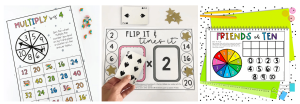Maths anxiety is a feeling of fear and can affect students’ confidence, motivation, and ability to learn maths. Ultimately, this feeling of dread can increase during math-related tests, i.e., in this instance, NAPLAN.
In the context of NAPLAN, Maths anxiety can lead to lower test scores, which can negatively impact a student’s academic progress and, more importantly, their overall self-confidence.
Therefore, it is important for educators and parents to address Maths anxiety and provide support and resources to help students overcome it. Talking about it is the first step towards validating such feelings and working towards strategies to cope when maths anxiety kicks in.
Here are 7 ideas to help your students experience success, build confidence and say goodbye to Maths anxiety in the lead-up to NAPLAN:
1. Play Games
We are massive advocates for games to make Maths fun! But they are so beneficial in reducing anxiety around the subject area too. Games add a social element (peer mentoring), they take away pressure when it comes to answering a question correctly, and we know kids learn through play! By playing games, students are familiar with and experiencing success will lead to greater confidence in time.
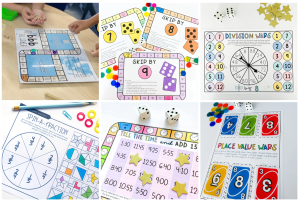
Here are some fun examples to help you get started:
2. Dedicate time to fluency
Often, the brain power needed in Maths puts up blocks for our students. We want to help them develop fluency in number facts, so not so much thinking is required when answering problems (i.e., number facts, times tables etc.)
How can we do this? Playing games or through repeated practice and by making it fun where possible. We love activities such as these:
3. Maths-related Crafts
Crafts can be a fun way to help children visualise math concepts and make them more tangible, especially for the kinaesthetic learners in your classroom. For example, using pipe cleaners to make geometric shapes and labelling them with their features, creating chatterboxes to help number fact fluency, making pictures with fractions or making visual anchors like these division wheels below.
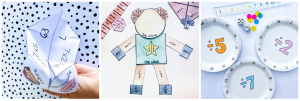
4. Write the room
A long time ago (before these were ‘in education fashion’) we would call these an ‘active worksheet’ because that is exactly what it is – students answer questions/problems that would usually be on a worksheet, but instead, they are posted around the classroom and students move from question to question.
You may want to focus on problem-solving for this sort of activity to help prepare students for NAPLAN. Using old test papers builds familiarity with the layout and style of questioning when it does come to test day.
Again, this sort of task encourages peer mentoring, requires movement, which is great for the brain and learning, and if done right, can be self-correcting as well!
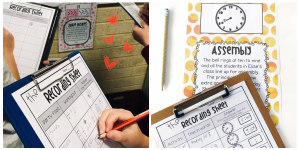
5. Create a low-pressure environment
This is where our Growth Mindset strategies come into play. Students need to know that to be a successful mathematician, they need to have a go and good learners make mistakes. Taking the fear away from making mistakes is the first step in creating confident mathematicians in your classroom.
Play a game where you choose your favourite wrong answer. Share it with the class and work together to remedy the solution. This allows students to share their mathematical thinking and see and learn how to work through a problem.
Here are some mantras we like to use:
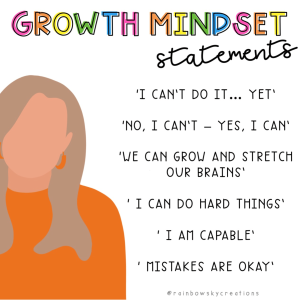
6. Offer emotional support and encouragement
It’s important to create a positive learning environment where children feel comfortable asking questions and making mistakes (see our point above about Growth Mindset). Celebrate small victories with your students and praise them for their effort and progress.
7. Familiarise with language
More often than not, kids get caught up or confused with the language used on tests like NAPLAN. Help them by putting aside a lesson purely dedicated to some of the words they may come across and what they actually mean. For example: If a student sees the question: What is the total of 5 and 5 – they will be able to work out the question is asking for addition.
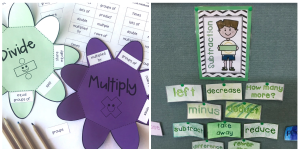
8. Forewarned is forearmed
When students know what is coming, it allows them to be prepared. So, talk about the ‘elephant in the room.’ Discuss how it makes kids feel and that those feelings are okay (validation can go a long way). Talk about what the day will look like, the table layout, materials they’ll have, types of questions etc. What you will do after the test – hopefully celebrate for showing stamina, independence and grit.
This could look like playing a game, an early recess or blowing bubbles on the oval and letting off steam.
Emotional support is just as important as academic support in helping children succeed in math.
Remember, the key to overcoming math anxiety is to make maths fun, engaging, and relevant to children’s lives.
By incorporating these ideas into your classroom Maths routine, you can help them develop a positive attitude towards maths and build their confidence in this important subject.
We wish your students the best of luck with their upcoming NAPLAN tests.
Before you go…
Do you wish you could easily differentiate your maths lessons? For them to run with ease while all students are learning but also having fun?
We have the answer for you!
Check out
TRANSFORM YOUR MATHS GROUPS.
In just a week learn how to transform your lessons with maths groups so that you meet the learning needs of every student!

Click here to learn more
What to read next:
Preparing Your Students for NAPLAN
How to Plan Fun and Engaging Maths Lessons

